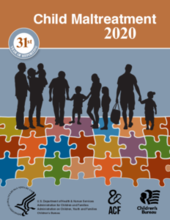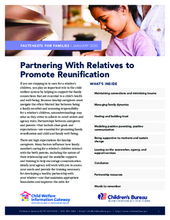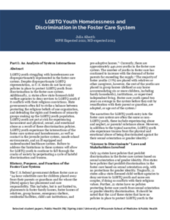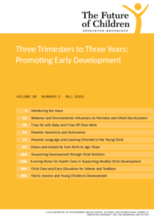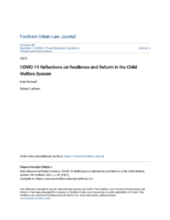This page contains documents and other resources related to children's care in the Americas. Browse resources by region, country, or category.
Displaying 441 - 450 of 1438
In response to the ongoing call for a complex systems approach for understanding and informing child welfare practice and policy, this article presents a context-specific conceptual framework that combines complexity theory and network analysis.
This study examined whether caseworker demographic factors, attitudes towards evidence-based practices (EBPs) and organizational factors predict caseworker referrals. Relying upon tenets of the Theory of Planned Behavior, this study also examined whether intention to refer predicts caseworker referrals to an EBP.
In this paper, the authors report the results of a study examining parenting challenges among a sample of African immigrant parents in Alberta, Canada.
Child Maltreatment 2020 is the latest edition of the annual Child Maltreatment report series. States provide the data for this report via the National Child Abuse and Neglect Data System (NCANDS). NCANDS was established as a voluntary, national data collection and analysis program to make available state child abuse and neglect information. Data have been collected every year since 1991 and are collected from child welfare agencies in the 50 states, the Commonwealth of Puerto Rico, and the District of Columbia.
Child Maltreatment 2020 is the latest edition of the annual Child Maltreatment report series. States provide the data for this report via the National Child Abuse and Neglect Data System (NCANDS). NCANDS was established as a voluntary, national data collection and analysis program to make available state child abuse and neglect information. Data have been collected every year since 1991 and are collected from child welfare agencies in the 50 states, the Commonwealth of Puerto Rico, and the District of Columbia.
This factsheet shares the experiences and advice of families who have had relatives in
kinship care arrangements to highlight the dynamics and steps that can support reunification.
This analysis of system dysfunction in the U.S. involving legislative powers, child welfare agencies, and peripheral systems, such as juvenile justice, schools, and healthcare, reveals a distinct misalignment in shared values.
This issue of the Future of Children focuses on the first years of life starting with in utero experiences.
This exploratory research led by Kindernothilfe between May – July 2020 shows how the challenges facing working children and their families have been exacerbated since the outbreak and it presents their recommendations for effective and relevant responses to the pandemic.
Focusing on three critical facets of the U.S. child welfare system — reporting and investigating maltreatment, placement and other system metrics, and permanency — this Essay explores how the pandemic impacts the child welfare system and how the system should respond.


